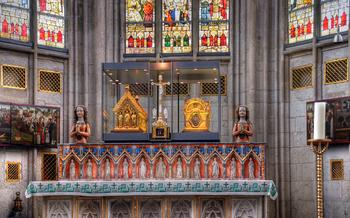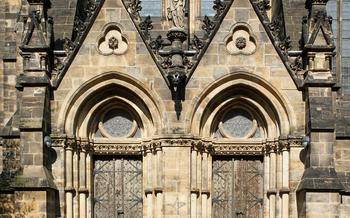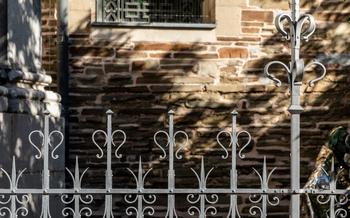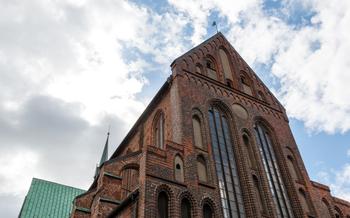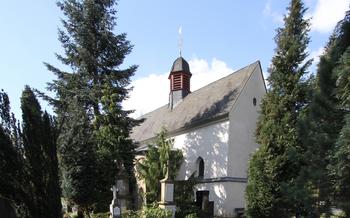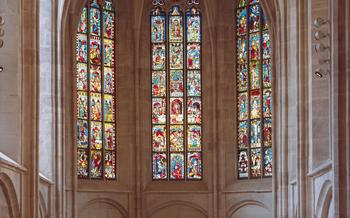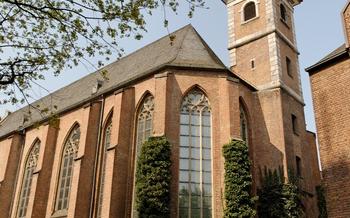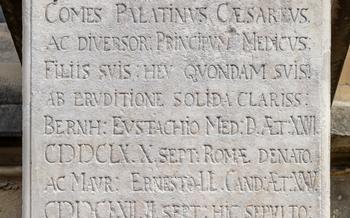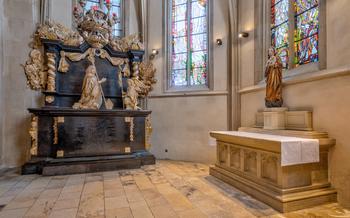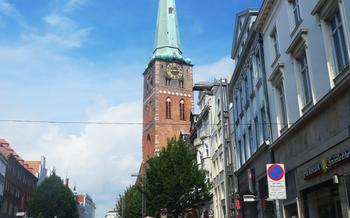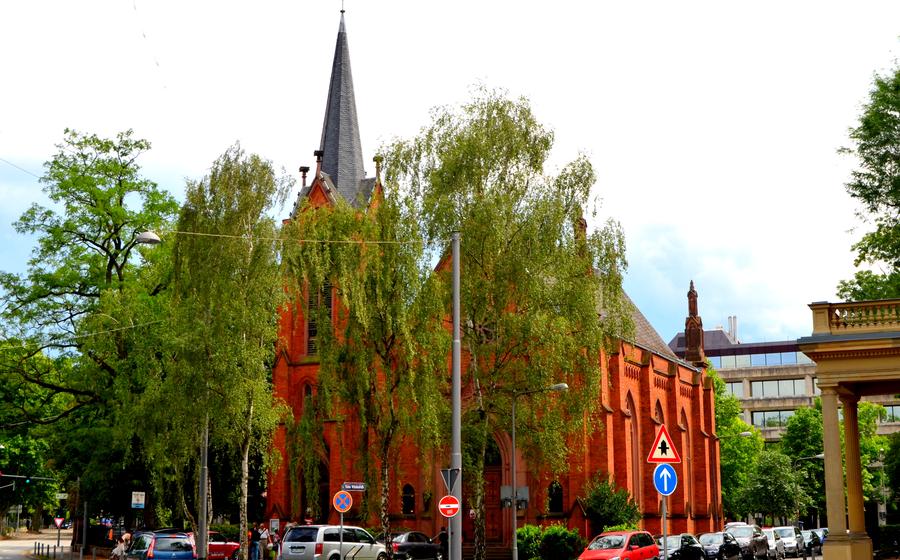
The English Church
- The English Church: A Historical Landmark in Wiesbaden
- Exploring the Church's Interior
- The Churchyard: A Place of Remembrance
- Guided Tours and Open Days
- Attending Services and Events
- The English Church as a Cultural Venue
- The English Church's Role in the Local Community
- Historical Context of the English Church
- Architectural Highlights of the Church
- The Churchyard's Stories and Symbolism
- Practical Tips for Visitors
- Local Insights and Anecdotes
- Theological and Spiritual Significance
- The English Church as a Symbol of Unity
- Insider Tip: Hidden Gems to Discover
The English Church: A Historical Landmark in Wiesbaden
Standing tall amidst the vibrant city of Wiesbaden, the English Church holds a significant place in both the religious and cultural landscape of the region. Its historical roots trace back to the 19th century, when Wiesbaden emerged as a popular destination for British travelers and expatriates seeking respite and treatment for their ailments in the city's renowned spas. With the influx of English visitors, the need for a dedicated place of worship arose, leading to the establishment of the English Church in 186Designed in the Gothic Revival style, the church exudes an aura of grandeur and spirituality, reflecting the architectural influences prevalent during that era.
Over the years, the English Church has played a pivotal role in the local community, serving as a spiritual home for generations of British residents and visitors. It has also become an important landmark, symbolizing the rich cultural heritage and cosmopolitan spirit of Wiesbaden. Notable events and figures have graced the church's hallowed halls, adding to its historical significance and allure.
Exploring the Church's Interior
The interior of the English Church in Wiesbaden is a testament to its rich history and architectural significance. As you step inside, you are immediately greeted by a sense of awe and reverence. The nave is adorned with beautifully preserved stained glass windows, each depicting scenes from the Bible or the life of Christ. The intricate details and vibrant colors of the glasswork create a kaleidoscope of light that dances across the room, adding to the sacred atmosphere.
The altar, located at the east end of the church, is a masterpiece of craftsmanship. Intricately carved wooden panels depict biblical scenes, while the altar itself is adorned with gold and silver ornaments. The pulpit, positioned to the side of the altar, is equally impressive, featuring delicate carvings and intricate designs.
The organ, situated at the back of the church, is a musical masterpiece. With its towering pipes and intricate carvings, it dominates the room and fills it with beautiful melodies during services and concerts. The music resonates throughout the space, creating an uplifting and spiritual experience for all who hear it.
The Churchyard: A Place of Remembrance
The churchyard of the English Church in Wiesbaden is a serene and contemplative space, steeped in history and significance. Established in the mid-19th century, it serves as the final resting place for many prominent figures and members of the local community.
One notable feature of the churchyard is its war memorials, which pay tribute to those who lost their lives in conflicts such as World War I and World War II. These memorials serve as a poignant reminder of the human cost of war and the sacrifices made by individuals and families.
Interspersed among the graves are a variety of unique headstones and inscriptions, each telling a story of the individuals buried there. From elaborate family plots to simple markers, the churchyard offers a glimpse into the lives and legacies of those who have shaped Wiesbaden's history.
Oltre alle tombe, il cimitero ospita anche una serie di monumenti e sculture, molti dei quali risalgono al XIX secolo. Queste opere d'arte aggiungono un ulteriore livello di interesse e bellezza al paesaggio del cimitero e forniscono uno spunto per la riflessione sulla mortalità e il ricordo.
In the midst of the historical significance, the churchyard also exudes a peaceful and tranquil atmosphere. Mature trees provide shade and shelter, while the sound of birdsong and the gentle breeze create a sense of serenity. Whether seeking a moment of contemplation or simply enjoying the beauty of the surroundings, the churchyard is a place that invites visitors to pause and reflect.
Guided Tours and Open Days
The English Church in Wiesbaden offers guided tours and open days to visitors who wish to explore its history, architecture, and significance within the local community.
Guided tours are available upon request and typically last for around 45 minutes to an hour. Visitors can learn about the history of the church, its unique features, and its role in the lives of the local community. The tours are led by knowledgeable guides who can answer questions and provide additional insights.
During the tours, visitors can explore the church's interior, including the stained glass windows, the altar and pulpit, and the organ. They can also visit the churchyard, where they can learn about the history and significance of the memorials and headstones.
Open days are held regularly throughout the year, offering visitors the chance to explore the church and its grounds at their own pace. During open days, visitors can wander through the churchyard, admire the architecture, and soak up the peaceful atmosphere.
To book a guided tour or find out more about the church's open days, visitors can contact the church office or visit the church's website.
Attending Services and Events
The English Church in Wiesbaden welcomes visitors and locals alike to attend its regular services and special events. Every Sunday, the church holds two services, one in the morning and one in the evening, conducted in the Anglican tradition. These services offer a warm and welcoming atmosphere, with opportunities for reflection, prayer, and singing.
Throughout the year, the church also organizes various special events, such as seasonal celebrations, concerts, and community gatherings. These events provide an excellent opportunity to experience the church's vibrant community spirit and engage with fellow attendees. Music plays a significant role in the church's services and events. The church's talented choir and organist lead the congregation in hymns and anthems, creating a truly uplifting and inspiring atmosphere.
Regular services are open to everyone, regardless of religious affiliation or background. For those interested in attending special events, it is advisable to check the church's website or contact the church office for more information and to confirm dates and times.
The English Church as a Cultural Venue
Beyond its religious significance, the English Church in Wiesbaden has established itself as a vibrant cultural venue, hosting a diverse range of events that enrich the local community. The church's spacious interior and its unique atmosphere provide an ideal setting for exhibitions, lectures, workshops, and art installations.
Exhibitions showcasing local and international artists are regularly held within the church, offering visitors an opportunity to appreciate a variety of artistic expressions. The church's historic architecture serves as a backdrop for contemporary artworks, creating a captivating dialogue between the past and the present.
Thought-provoking lectures and workshops are organized on a regular basis, covering a wide range of topics from history, theology, and philosophy to music, art, and literature. These events provide a platform for experts and enthusiasts to share their knowledge and engage in meaningful discussions with the community.
The church also hosts music concerts featuring talented musicians from the region and beyond. The church's acoustics enhance the performances, creating an immersive musical experience for the audience. From classical recitals to contemporary compositions, the concerts offer a diverse range of musical genres.
The English Church's commitment to promoting cultural understanding extends to hosting art installations that explore the intersection of faith, art, and society. These installations often challenge traditional notions and invite visitors to reflect on the deeper meanings of life and spirituality.
The English Church's Role in the Local Community
Beyond its spiritual significance, the English Church in Wiesbaden actively engages with the local community through various initiatives. The church serves as a venue for charitable events, supporting organizations that work towards social welfare and community development. Its outreach programs extend to those in need, offering assistance to marginalized groups and individuals facing challenges.
The church fosters interfaith dialogue, promoting understanding and cooperation among different religious communities in Wiesbaden. It hosts events and workshops that bring together people from diverse backgrounds to explore common values and engage in meaningful conversations. Through these initiatives, the English Church plays a vital role in building bridges of understanding and promoting cultural harmony within the city.
Its commitment to social responsibility and community engagement has earned the English Church widespread recognition and respect in Wiesbaden. It is seen as a beacon of hope and support, offering a helping hand to those in need and contributing to the overall well-being of the city's residents.
Historical Context of the English Church
Wiesbaden's rich cosmopolitan history played a significant role in the establishment of the English Church. During the 19th century, the city witnessed a surge of British visitors, drawn to its renowned spas and vibrant cultural scene. These visitors included Anglican clergy and missionaries, who recognized the need for a place of worship for English-speaking residents and travelers.
The presence of a sizeable English community in Wiesbaden led to the establishment of the Anglican chaplaincy in 186Initially, services were held in various rented spaces, including a local hotel. However, the growing congregation necessitated the construction of a dedicated church building.
In 1868, the foundation stone for the English Church was laid, and the building was completed in 1870. The church's establishment marked a significant milestone in the history of Wiesbaden's international community, providing a spiritual home for Anglicans and other English-speaking residents.
Architectural Highlights of the Church
The English Church in Wiesbaden proudly stands as a remarkable testament to the Gothic Revival style, showcasing a harmonious blend of traditional elements and modern interpretations. Its soaring spires, intricately carved buttresses, and ornate interior design elements create a truly awe-inspiring atmosphere. The pointed arches, ribbed vaults, and stained glass windows are reminiscent of grand cathedrals, while the intricate carvings and decorative motifs pay homage to the craftsmanship of the Victorian era.
The church's interior is a symphony of light, color, and symbolism. The stained glass windows depict biblical scenes and figures, casting a warm glow upon the nave. The altar and pulpit are adorned with intricate carvings and sculptures, each telling a story of faith and devotion. The organ, with its majestic pipes and resonant tones, adds a touch of grandeur to the sacred space.
Every corner of the church reveals a new architectural detail, a hidden symbol, or a story waiting to be discovered. The English Church is a masterpiece of Victorian Gothic architecture, a testament to the enduring power of faith and the beauty of human artistry.
The Churchyard's Stories and Symbolism
The churchyard surrounding the English Church is a poignant testament to the passage of time and the lives lived within the Wiesbaden community. Each headstone, memorial, and inscription tells a unique story, offering a glimpse into the rich history of the church and the diverse individuals who have been laid to rest here.
Notable figures from Wiesbaden's past, such as esteemed politicians, renowned artists, and influential businessmen, have found their final resting place within the churchyard. Their graves, often adorned with intricate carvings and heartfelt inscriptions, serve as a reminder of their contributions to the city's development and cultural heritage.
The churchyard also bears witness to the tragic events that have touched Wiesbaden throughout history. War memorials, erected in remembrance of those who lost their lives in conflicts, stand as a solemn tribute to their sacrifice. The names of fallen soldiers, etched in stone, evoke a sense of loss and reflection, reminding visitors of the human cost of war.
Beyond the historical significance, the churchyard exudes a serene and contemplative atmosphere. The carefully tended grounds, adorned with colorful flowers and mature trees, provide a peaceful sanctuary amidst the bustling city. Visitors can wander among the graves, taking time to ponder the lives of those who have gone before them and reflect on the transient nature of existence.
The churchyard's symbolism extends beyond its individual stories. It is a microcosm of the larger tapestry of life, representing the interconnectedness of generations and the enduring legacy of the past. As visitors explore this sacred space, they are invited to contemplate their own mortality and the significance of their own lives within the grand scheme of history.
Practical Tips for Visitors
Before embarking on your visit to the English Church in Wiesbaden, here are some practical tips to make your experience more enjoyable:
-
Accessibility: The church is wheelchair accessible, with ramps and designated seating areas for those with limited mobility. If you have any specific accessibility requirements, please feel free to contact the church office in advance.
-
Photography guidelines: While photography is generally allowed inside the church, it is important to be respectful and avoid taking photos during services or events. Please ask for permission before taking any photos of individuals.
-
Dress code: There is no strict dress code for visiting the church, but visitors are encouraged to dress respectfully, as is customary in any place of worship.
-
Respecting the sanctity of the church: Remember that the English Church is an active place of worship, and visitors should be mindful of the ongoing religious activities. Please maintain a respectful silence and avoid any disruptive behavior during services or events.
Local Insights and Anecdotes
The English Church in Wiesbaden has been a source of inspiration and fascination for locals and visitors alike throughout its history. Many personal stories and anecdotes are woven into the fabric of the church, adding to its charm and significance.
One local resident, Frau Schmidt, recalls her childhood memories of attending Sunday services at the church with her family. She remembers the beautiful music, the stained-glass windows that cast colorful light onto the pews, and the sense of community among the congregation.
Another parishioner, Herr Müller, shares a story about a time when the church provided refuge to a group of refugees during a particularly harsh winter. The church opened its doors and offered shelter, food, and warmth to those in need, demonstrating the compassion and generosity of the local community.
Over the years, the church has also been a popular gathering place for social events and celebrations. Annual church fetes, complete with local delicacies, music, and games, have brought together people from all walks of life, fostering a sense of unity and belonging.
These personal stories and anecdotes add a human dimension to the history of the English Church, making it a truly special and cherished place for the people of Wiesbaden.
Theological and Spiritual Significance
The English Church in Wiesbaden is not only a historical and architectural landmark but also holds deep theological and spiritual significance for its congregation and the wider Christian community. As an Anglican church, it adheres to the traditions and practices of the Church of England, emphasizing the importance of Scripture, liturgy, and the sacraments.
Regular services, including Holy Communion, are held every Sunday, allowing parishioners to come together for worship, prayer, and fellowship. Special events such as Christmas services, Easter celebrations, and confirmation ceremonies further enrich the church's spiritual calendar.
The church also serves as a place of reflection and contemplation, inviting visitors to explore their faith and connect with the divine. The peaceful atmosphere, beautiful stained glass windows, and inspiring sermons create a conducive environment for spiritual growth and introspection.
Beyond its role as a place of worship, the English Church actively engages in interfaith dialogue and promotes cultural understanding. It hosts lectures, workshops, and discussions on topics related to religion, ethics, and social justice, fostering a spirit of openness and mutual respect among people of different faiths and backgrounds.
The English Church as a Symbol of Unity
The English Church in Wiesbaden stands as a powerful symbol of unity, transcending national and cultural boundaries. Throughout its history, it has brought together people from diverse backgrounds, fostering a sense of community and belonging. The church's inclusive spirit is reflected in its welcoming atmosphere, where visitors and locals alike are embraced with open arms.
Regular services and events provide opportunities for people to come together in worship, prayer, and fellowship. These gatherings create a sacred space where differences are set aside, and a shared sense of spirituality is experienced. The church also hosts a variety of cultural events, such as concerts, exhibitions, and lectures, which attract a diverse audience interested in exploring different perspectives and ideas.
Beyond its physical walls, the English Church actively promotes tolerance and acceptance within the local community. It engages in interfaith dialogue, collaborating with other religious institutions to build bridges of understanding and cooperation. The church's commitment to fostering a harmonious and inclusive society extends to its support for charities and community outreach programs, which address the needs of vulnerable individuals and families.
As a symbol of unity, the English Church in Wiesbaden plays a vital role in strengthening the bonds that connect people from all walks of life. It stands as a testament to the power of faith and community in overcoming divisions and building a more inclusive and harmonious society.
Insider Tip: Hidden Gems to Discover
Beyond the main attractions of the English Church, there are several hidden gems waiting to be discovered by curious visitors. One such treasure is the secret garden nestled within the churchyard. This tranquil oasis, adorned with colorful blooms and fragrant herbs, offers a serene escape from the bustling city. Visitors can stroll along the winding paths, admire the vibrant flora, and find a quiet spot to reflect or simply soak in the beauty of nature.
Another hidden gem is the breathtaking view from the bell tower. While not always accessible, visitors who inquire may be granted the opportunity to climb the narrow spiral staircase to the top. The panoramic vista from the tower is simply stunning, offering unparalleled views of Wiesbaden's cityscape, the surrounding countryside, and even the distant Taunus Mountains.
For those interested in delving deeper into the church's history, the church archives hold a wealth of fascinating artifacts and documents. These include old photographs, records of baptisms, marriages, and burials, as well as correspondence with notable figures who have visited or been associated with the church. Visitors are welcome to request access to the archives and explore these historical treasures.
Finally, the annual church fete is a not-to-be-missed event that showcases the vibrant community spirit of the English Church. Held during the summer months, the fete features an array of local delicacies, from traditional British fare to international cuisine. There are also games, music, and entertainment for visitors of all ages. It's a wonderful opportunity to mingle with parishioners, savor delicious food, and experience the church's welcoming atmosphere firsthand.
